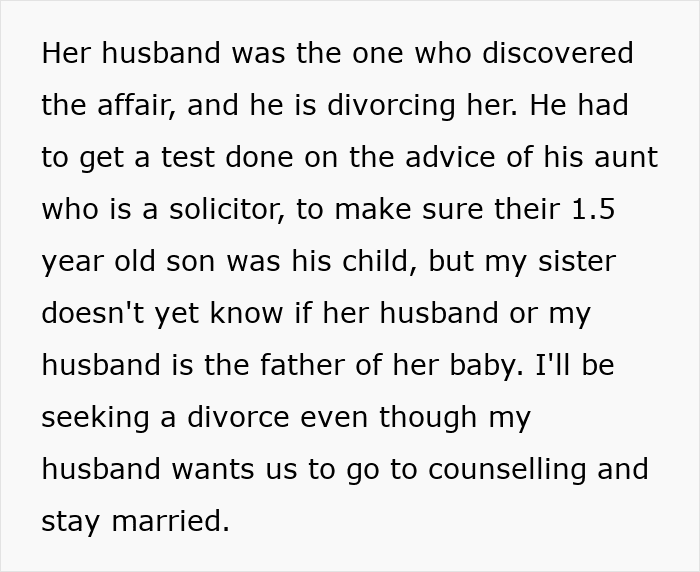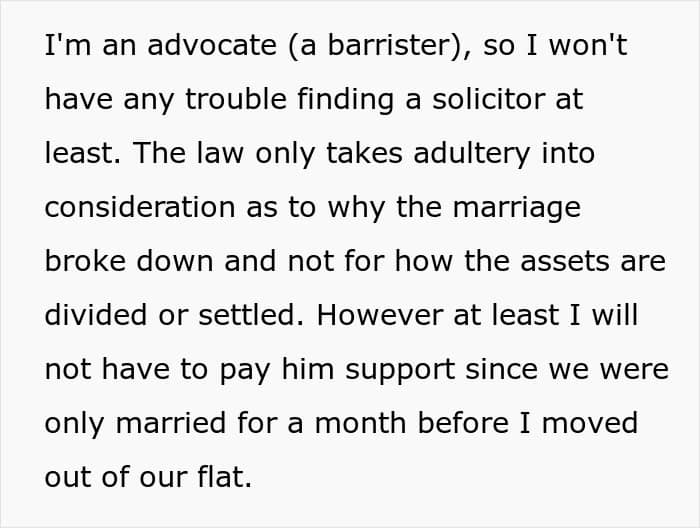People find out about their partner’s infidelityin many different ways. Some cheaters confess when the burden just becomes too much or when their partner confronts them. Others are discovered by a third party. But research shows that 21.4% of cheaters are exposed by their own partners.
That’s what happened to these cheaters: a husband discovered his wife and her sister’s husband were having an affair. After the word got to the sister, she detailedher experience online, confessing how she would never be able to forgive either culprit, especially since the affair resulted in pregnancy and the pair planned to get married after the divorces were finalized.
RELATED:A woman discovered that her husband had been cheating with her sister since before their wedding

In an attempt to heal and make sense of the situation, she shared her story online





“This is one of the worst ways to be cheated on,” the commenters sympathized with the woman




























A few months later, the woman posted an update about the divorce process and how she was coping
















Cheaters should not be forgiven if any of these four conditions are true
How can one forgive such a horrible thing as cheating? The people in the comments under this story expressed no judgment of the wife for not being able to forgive her husband or her sister. Indeed, whether to forgive cheaters is a really personal decision. And there are a lot of circumstances that either make that decision harder or easier.
Mental health experts say that there are different reasons why you should or should not forgive someone for infidelity. The ones not to forgive include:
They’re a serial cheater. If a partner has cheated before and doesn’t express remorse, the odds are they’re going to do it again. According to Saba Harouni Lurie, LMFT, “the relationship is harmful and unhealthy for you and that instead of focusing on forgiving your partner, you would benefit from prioritizing yourself and your care.”If you have doubts over whether to forgive. An individual should be sure they want and are ready to forgive a partner that has been unfaithful. If intuition is telling you not to do it, odds are you’re not 100% on board with the decision.The cheating party has to take all the blame. As licensed clinical psychologist Kathy Nickerson, PhD, told We previously, “True recovery happens when the unfaithful partner takes full responsibility, acknowledges the deeper reasons behind their choices, and commits to doing the work to heal both the relationship and themselves.”The cheater tries to manipulate, gaslight, or deny your feelings. Sometimes, cheating can be part of other harmful tactics exhibited by the partner. According to Lurie, if a partner uses “gaslighting or other attempts to manipulate you or the situation, their harmful behaviors likely extend beyond cheating.”
In a previous interview for We, Dr. Kathy Nickerson also added that, in her experience, affair relationships don’t last. “The unfaithful partner may believe they’re in love, but that ‘love’ is often built on obsession, fantasy, escape, and a distorted sense of reality—not true compatibility.”

Image credits: freepik (not the actual image)
Men and women cheat and forgive for infidelity in different ways
Cheating has been a part of the human experience since the very dawn of relationships. Research from the University of Colorado Boulder shows that 34% of people in committed relationships cheat: 21% of men and 13% of women. Proximity also plays a role in affairs. Most (53.5%) cases of infidelity occur with people whom the cheaters know well, like close friends. 29.4% happen with co-workers, neighbors, or acquaintances.
Apparently, the reasons for cheating and types of infidelity differ for men and women. A 2023 study published in The Journal of the Evolutionary Studies Consortiumstudied the answers from 94,943 people to gain better insight into the subject.
They found that women tend to have emotional affairs more often and engage in infidelity online. The women also felt they had justification for being unfaithful, such as having problems in the marriage or feeling dissatisfied in bed.
Men, on the other hand, would engage in physical infidelity more often. Whereas women would do it with someone their husbands knew, men were more likely to cheat with strangers and to do it more than once.
When it comes to forgiving their partners for cheating, women were also found to be less forgiving. While men were more likely to stay and try to repair the relationships, women would leave their husbands after being cheated on.

Image credits: gpointstudio (not the actual image)
Commenters didn’t judge the woman for not forgiving the cheater: “You did best for yourself, not every action can be forgiven”





























